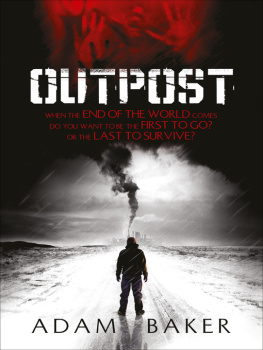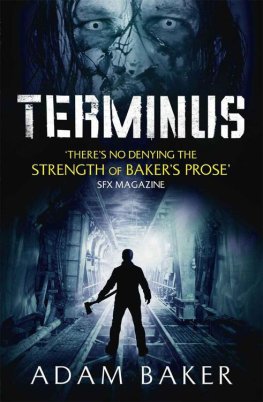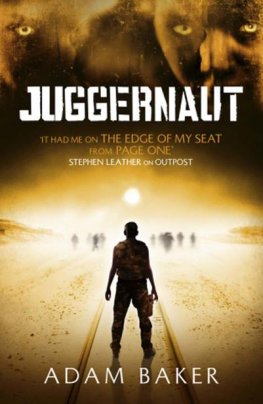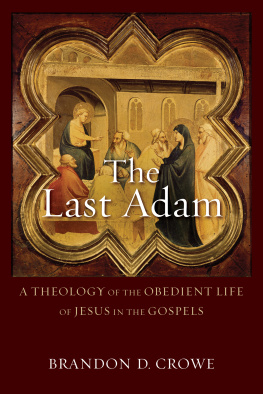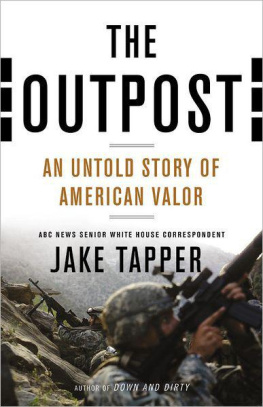Adam Baker - Outpost
Here you can read online Adam Baker - Outpost full text of the book (entire story) in english for free. Download pdf and epub, get meaning, cover and reviews about this ebook. year: 2011, publisher: Hodder General Publishing Division, genre: Art. Description of the work, (preface) as well as reviews are available. Best literature library LitArk.com created for fans of good reading and offers a wide selection of genres:
Romance novel
Science fiction
Adventure
Detective
Science
History
Home and family
Prose
Art
Politics
Computer
Non-fiction
Religion
Business
Children
Humor
Choose a favorite category and find really read worthwhile books. Enjoy immersion in the world of imagination, feel the emotions of the characters or learn something new for yourself, make an fascinating discovery.
- Book:Outpost
- Author:
- Publisher:Hodder General Publishing Division
- Genre:
- Year:2011
- Rating:4 / 5
- Favourites:Add to favourites
- Your mark:
- 80
- 1
- 2
- 3
- 4
- 5
Outpost: summary, description and annotation
We offer to read an annotation, description, summary or preface (depends on what the author of the book "Outpost" wrote himself). If you haven't found the necessary information about the book — write in the comments, we will try to find it.
Adam Baker: author's other books
Who wrote Outpost? Find out the surname, the name of the author of the book and a list of all author's works by series.
Outpost — read online for free the complete book (whole text) full work
Below is the text of the book, divided by pages. System saving the place of the last page read, allows you to conveniently read the book "Outpost" online for free, without having to search again every time where you left off. Put a bookmark, and you can go to the page where you finished reading at any time.
Font size:
Interval:
Bookmark:
Table of Contents
Outpost
Adam Baker
First published in Great Britain in 2011 by Hodder & Stoughton
An Hachette UK company
Copyright Adam Baker 2011
For Helen

Rampart
The Barents Sea is so cold that if it were still for a day, if it were no longer churned by Arctic winds and ocean currents, it would freeze solid. You could walk across it. Shine a searchlight downward and illuminate the ice-locked dreamscape of the ocean floor. Ridges and canyons, silted wrecks, eyeless organisms that live and die in perpetual darkness.
The Con Amalgam refinery Kasker Rampart is anchored a kilometre from the clustered islands of Franz Josef Land. A skeleton crew of fifteen haunt corridors and accommodation blocks that used to be home to a thousand men. Each day they perform desultory system checks then get stoned, watch TV, or stare out of a porthole at the bleak sun. They retreat into memory, navigate a landscape of nostalgia and loss, kill time until the day Con Amalgam reboot the platform and set the seabed pipeline pumping again.
Part One
Survival
Fat Girl
Jane woke, stretched, and decided to kill herself. If she hadn't found a reason to live by the end of the day she would jump from the rig. It felt good to have a plan.
Jane jogged down service tunnels on C deck. Part of her morning routine. The walls and deck plates were autumnal shades of rust. The pipework throbbed like a heartbeat. Heating, sewage, desalination.
Jane was fat. It often hurt to walk. She struggled to wipe each time she used the bathroom. It was the main reason she took a job on the rig. The gargantuan refinery would be her health farm. Six months sequestered from supermarkets and junk food restaurants. She would return to the world transformed.
Each morning she put on her super-ironic, super-self-hating, PORN STAR shirt and shuffled a kilometre-long circuit through the metal labyrinth. She wore Lycra cycle shorts so her thighs didn't chafe. She wore a towel wadded down the back of her shorts to stop perspiration trickling into the crack of her buttocks. Her tracksuit hung wet and heavy.
Jane used fire point fifty-nine as her finish line. A red locker full of breathing apparatus and extinguishers. Lung-bursting effort. The final stretch. She fell against the locker whooping for breath and fumbled for the Stop button of her watch with sweat- slick fingers. Fourteen minutes. She was getting slower. Barely faster than a walking pace. The first time she ran the route she flew fast and strong, but now her knees stung with each heavy footfall. She should rest for a few days, give her body a chance to recuperate, but she knew that if she broke her routine she might not run again.
She usually followed her daily run with calisthenics, punished her disgusting body with a round of sit-ups and squat-thrusts, but this morning she was overcome by a strength-sapping wave of what's-the-point. She returned to her room and stripped out of her wet clothes. She showered. She soaped her barrel belly, kneaded fistfuls of dough-flesh. Her skin, usually mottled pink and white like the inside of a pork pie, blushed red under the heat of the shower jet.
She towelled herself dry. She dusted the creases and folds of her body with talc and sprayed herself head-to-toe with deodorant. She avoided her reflection. She hated mirrors. Sagging breasts. Rolls of blubber as if her flesh were poured from a jug in gloops and folds like thick custard.
She dressed. She clipped her dog-collar in place and headed for the chapel.
The chapel was last in a row of retail units. Three years ago, when the refinery ran at full capacity, Con Amalgam provided a hairdresser, a general store and movie rental. Now the mall units were shuttered and padlocked. The remaining crew still called it Main Street.
Jane unlocked the chapel and hit the lights. The chapel was a white room filled with metal chairs. Coloured wall lamps projected the illusion of stained glass.
She took her cassock from a cupboard and wrestled it on.
She began the service. She blessed empty chairs. She sang along to ''Classic Hymns of Worship'.
She stood at the lectern and read her sermon. She read the same sermon every week. Sometimes she read it in a silly voice. Sometimes she read it backwards. Today she gave up halfway through. She folded each page into a paper plane and flew them across the room. She experimented with different wing designs to see if she could reach the back wall.
'It's a tough job,' the bishop had said, as they sipped sherry in his study. 'You'll be away from home a long time. Youll be mother to a thousand men. Deckhands. Brawlers. A tough crowd.'
'My dad used to be a sailor,' said Jane. 'I can handle roughnecks.' But she couldn't handle irrelevance.
Rampart used to be a busy town. Installation lights burned through the Arctic night as if a chunk of Manhattan broke loose and floated away. There was a cinema, a gym and a Starbucks. There was even a radio station. Three marshals kept order. There was no booze on the rig but tempers ran high. Long shifts and nowhere to go when they were done. Sometimes fights got out of hand. Marshals zapped the participants with a Taser and let them cool off in a holding cell.
A deckhand job on an Arctic rig was like joining the Foreign Legion. Guys fled bereavement, addiction, all kinds of personal failure. Jane expected to nurse tough men through those midnight hours of heartbreak and loss. Let them talk it out in the privacy of the chapel. Send them home fixed and whole. Instead she found twilight and dereliction.
'I can't understand why they sent you here,' shouted Punch, as he helped Jane lift her kit-bag from the supply chopper.
Gareth Punch. Ginger goatee. Short and slight. Mid-twenties.
'I suppose your Church didn't hear the place got moth- balled.' They ran from a typhoon of rotor-wash as the Sikorsky took off. 'Rampart hasn't been pumping for a year. The Kasker field is running dry. All the easy oil got sucked. Sooner or later the rig will get redeployed someplace like the Gulf of Mexico or sold to India for scrap. Dumb bureaucracy. Same wherever you go. Anyway. Hello.' He shook Jane's hand. 'Gary Punch. I'm the chef.'
He showed Jane to the accommodation block. 'This is your room,' he said, 'but there are plenty of others if you want to switch. You have this entire block to yourself. Most of the crewmen meet for dinner in the canteen at seven. Other than that, people keep to themselves. Better get used to your own company, because this place is a ghost town.'
Jane threw her cassock over a chair. She took a chocolate bar from a stash hidden behind a big Bible in the vestry cupboard. She perched on the altar and ate. She was useless, alone and unloved.
She headed back to her room. It was a long journey down white corridors that receded to vanishing point. The refinery was so big some guys used bicycles to get around. The infirmary had a stretcher-car like a golf buggy. It was kept chained to stop the crew taking joyrides.
She walked the route out of habit, but stopped by an exterior door when it occurred to her there was no reason to return to her room. Earlier that morning she had resolved to jump from the rig. Why wait until nightfall?
She spun the hatch wheel and stepped into a quilted airlock.
WARNING
EXTREME COLD
SAFETY CLOTHING AND TWO-MAN PROTOCOL
AT ALL TIMES
She heaved open the exterior door and the sudden shock of cold sucked breath from her body. Vicious wind-chill. Minus thirty and no coat. Her skin burned.
Jane stepped out on to a walkway. Boot clang. Bleak daylight. A vast machine-scape. Massive storage tanks. Gantries, crossbeams and pipework dripped ice. A steel archipelago. One of the largest floating structures on earth.
Font size:
Interval:
Bookmark:
Similar books «Outpost»
Look at similar books to Outpost. We have selected literature similar in name and meaning in the hope of providing readers with more options to find new, interesting, not yet read works.
Discussion, reviews of the book Outpost and just readers' own opinions. Leave your comments, write what you think about the work, its meaning or the main characters. Specify what exactly you liked and what you didn't like, and why you think so.

